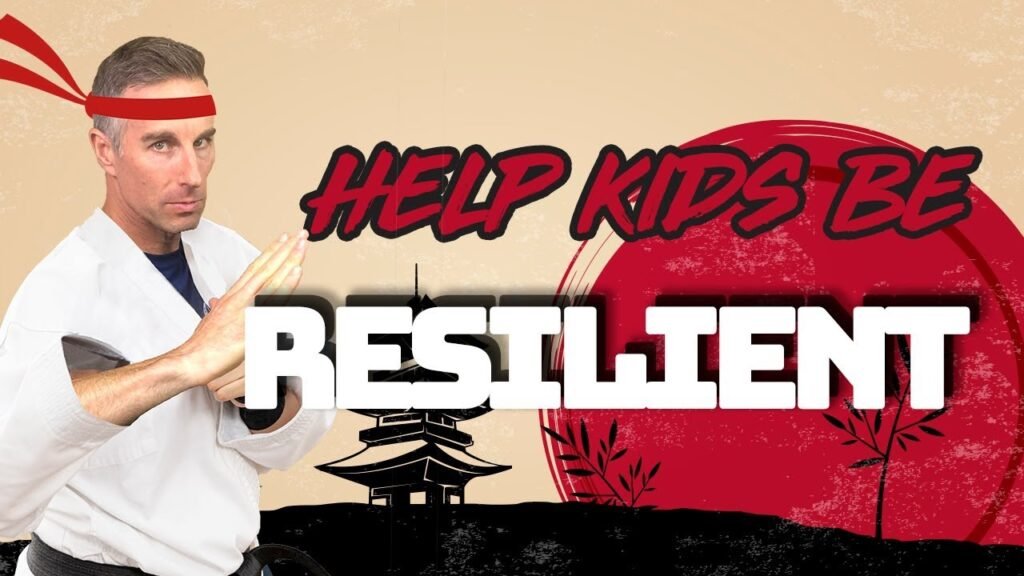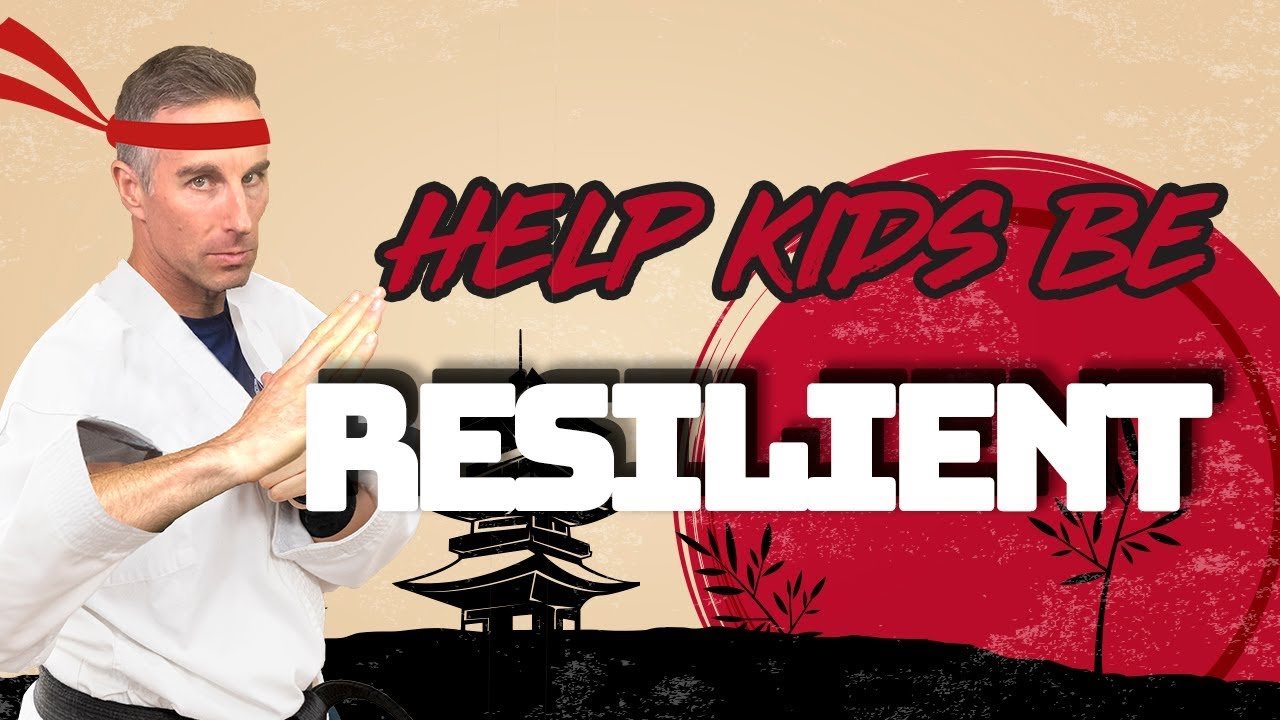In the video “How to Help Kids Build Resilience” by Dad University, the concept of resilience is explored. Resilience is crucial for children to develop, as it helps them navigate challenges and setbacks with confidence. Dad University emphasizes that resilience starts from a young age and can be taught by instilling a sense of confidence in children. By teaching kids that they are not at fault when someone is mean to them or acts in a negative way, they can develop a stronger sense of self and understand that the problem lies with the other person. Dad University encourages parents to foster resilience in their kids by allowing them to do things on their own and emphasizing the importance of feeling proud of themselves.

Understanding the Source of Resilience
Resilience is a vital skill that can help children cope with challenges and bounce back stronger in the face of adversity. To help kids realize the source of their resilience, it is important to make them understand where it comes from. Children often blame themselves for negative experiences or feel that they are not good enough when they face setbacks. It is crucial to teach them that resilience is not about personal shortcomings but about understanding that adversity and setbacks are a part of life. By helping children develop a positive mindset and building their self-confidence, parents and guardians can lay the foundation for resilience.
Building self-confidence in children’s abilities and worth is crucial in helping them develop resilience. From an early age, it is essential to allow children to do things on their own and feel self-sufficient. When children are given opportunities to take on age-appropriate tasks and succeed, they gain confidence in their abilities. Instead of relying on external validation, it is important to encourage children to feel proud of themselves. By emphasizing their accomplishments and praising their efforts, children develop a sense of self-worth, which contributes to their resilience.
Another important aspect of understanding the source of resilience is teaching children that other people’s actions are not their fault. Situations like bullying can significantly impact a child’s resilience and self-esteem. It is crucial to explain to children that bullying is not their fault or problem. They need to understand that the actions of bullies are a reflection of the bully’s character and not their own. Empowering children to stand up to bullies and seek help when needed can also enhance their resilience. By teaching children strategies to cope with bullying and building their resilience, parents and guardians can help them navigate such challenging situations.
Starting Resilience Education at a Young Age
Teaching resilience to children should start from a young age. It is important to recognize the significance of resilience education in shaping a child’s ability to face challenges. By introducing resilience concepts early on, children can develop the necessary skills and mindset to navigate life’s ups and downs effectively. Parents and guardians can help children realize that setbacks and difficulties are part of life and should be seen as opportunities for growth and learning.
Allowing children to do things on their own and feel self-sufficient is crucial in building their resilience. Age-appropriate tasks, such as dressing themselves or completing simple chores, can help children gain a sense of independence and competency. Encouraging children to take ownership of their actions and responsibilities fosters their resilience and self-reliance.
Furthermore, it is essential to shift the focus from external validation to internal satisfaction. Instead of depending on praise from others, parents and guardians should encourage children to feel proud of themselves. By recognizing their achievements and efforts, children develop a resilient mindset and understand that their worth is not determined by others’ opinions.
Teaching Kids to Handle Bullying
Bullying can have a profound impact on a child’s resilience and self-esteem. To help children handle bullying, it is crucial to explain to them that it is not their fault or problem. Children need to understand that the actions of bullies reflect the bullies’ issues and are not a reflection of their own worth. By reinforcing this understanding, parents and guardians can empower children to overcome the negative effects of bullying on their resilience.
It is also important to encourage children to stand up to bullies and seek help when needed. Teaching children strategies to cope with bullying, such as assertiveness skills and conflict resolution techniques, can enhance their resilience. By empowering children to address bullying situations assertively and seek support from trusted adults, parents and guardians help them develop the skills necessary to handle challenging situations.
Encouraging Problem-Solving Skills
Problem-solving skills play a crucial role in building resilience. Teaching children how to identify problems and brainstorm solutions helps them develop a proactive and resilient mindset. Encouraging a growth mindset, which sees setbacks as opportunities for growth, can also enhance a child’s problem-solving abilities.
Parents and guardians can encourage problem-solving skills by involving children in decision-making processes and allowing them to take responsibility for finding solutions to everyday challenges. By guiding children through the problem-solving process and providing support, parents and guardians help children develop the confidence and resilience needed to face future obstacles.
It is also important to teach children the value of learning from mistakes. By reframing mistakes as learning opportunities, parents and guardians foster resilience in children. Encouraging children to analyze their mistakes, identify the lessons learned, and apply them in future situations helps them develop problem-solving skills and resilience.
Developing a Supportive Network
Building a supportive network of family and friends is crucial in helping children develop resilience. Strong relationships with loved ones provide children with emotional support and encouragement. Parents and guardians can help children build these relationships by fostering open communication and support within the family.
Creating an environment where children feel comfortable expressing their thoughts, emotions, and concerns is essential. By actively listening to children, empathizing with their experiences, and providing emotional support, parents and guardians can help children develop resilience.
Furthermore, teaching children the importance of seeking help and support when facing challenges is essential. By encouraging children to reach out to trusted adults, friends, or support services, parents and guardians equip them with the tools to navigate adversity. Knowing that they have a network of support can significantly enhance a child’s resilience.
Fostering a Positive Mindset
A positive mindset is a crucial component of resilience. By promoting positive self-talk and optimism in children, parents and guardians contribute to the development of resilience. Teaching children to reframe negative experiences and find the silver lining in challenging situations enhances their ability to bounce back from setbacks.
Parents and guardians can foster a positive mindset by helping children recognize and challenge negative thoughts or self-doubt. Encouraging children to replace negative thoughts with positive ones and focus on their strengths and abilities builds their resilience and self-esteem.
Furthermore, teaching children to view setbacks and challenges as opportunities for growth is essential. Emphasizing that failure or mistakes are part of the learning process and encouraging children to approach them with a growth mindset can enhance their resilience. By instilling a belief in children that setbacks are merely temporary and that they have the power to overcome them, parents and guardians foster resilience.
Teaching Stress Management Skills
Stress is an inevitable part of life, and teaching children healthy coping mechanisms is crucial in building their resilience. By teaching kids stress management skills, parents and guardians equip them with tools to navigate challenging situations effectively.
Teaching children healthy coping mechanisms, such as deep breathing exercises, physical activity, or engaging in hobbies they enjoy, helps them manage stress. Promoting self-care practices, such as getting enough sleep, eating a balanced diet, and taking breaks from activities, supports children’s overall well-being and resilience.
Parents and guardians should also help children recognize signs of stress, such as irritability or changes in sleep patterns, and develop strategies to manage it effectively. By teaching children how to identify stress triggers and providing them with appropriate coping strategies, parents and guardians can enhance their resilience.
Emphasizing the Importance of Perseverance
Perseverance is a crucial trait that contributes to resilience. By teaching children the value of perseverance and not giving up easily, parents and guardians instill resilience in them.
Encouraging children to set goals and work towards achieving them fosters perseverance. By breaking down tasks into smaller, achievable steps and celebrating incremental successes, parents and guardians motivate children to persevere through challenges. Additionally, parents and guardians can help children understand that success often requires effort and persistence. By highlighting examples of individuals who have achieved success through perseverance, parents and guardians inspire children to develop resilient attitudes towards setbacks and adversity.
Modeling Resilience as a Parent or Guardian
As parents and guardians, modeling resilience is one of the most effective ways to teach children this skill. Children learn by example, and witnessing their parents or guardians demonstrate resilience and problem-solving skills can significantly impact their own resilience.
Demonstrating resilience and problem-solving skills in front of children shows them how to navigate challenges effectively. By openly discussing personal challenges and how they were overcome, parents and guardians provide insight into the resilience-building process. Sharing stories of resilience and emphasizing the importance of a positive mindset and perseverance helps children learn from real-life examples.
Being a positive role model for children to learn from is essential. Showing resilience in the face of adversity and exhibiting problem-solving skills in daily life teaches children the importance of these qualities. Parents and guardians should aim to be a consistent source of support and encouragement, demonstrating resilience and resilience-building techniques.
Conclusion
Resilience is a valuable skill that can be taught to children from an early age. By understanding the source of resilience and implementing strategies to encourage a positive mindset, problem-solving skills, and stress management techniques, parents and guardians can help children develop resilience. By fostering strong relationships, seeking support, and modeling resilience, parents and guardians lay a foundation for children to cope with challenges and bounce back stronger in the face of adversity. Investing in resilience education from a young age empowers children to face life’s ups and downs with confidence and adaptability.

